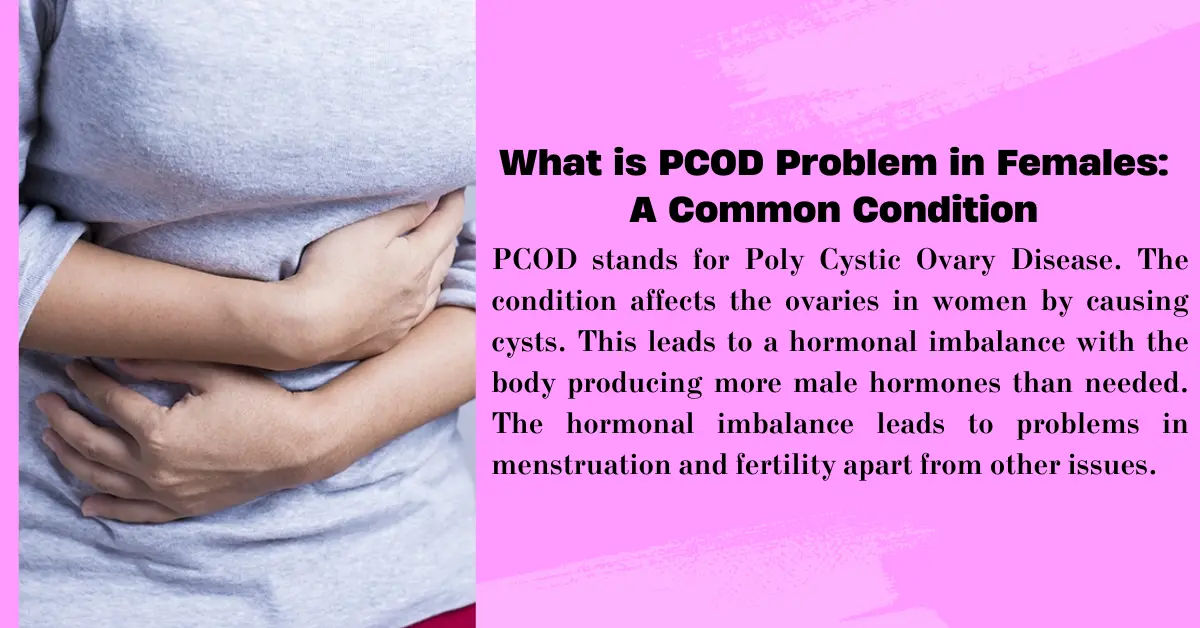
What is PCOD Problem in Females: A Common Condition
- 254
- 0
- 0
what is pcod problem in females?
PCOD, or Polycystic Ovary Syndrome (PCOS), affects approximately 8-13% of women of reproductive age worldwide. This means millions of women are impacted by this condition, making it one of the most common hormonal disorders in women. Proper awareness, diagnosis, and management are essential to help those affected lead healthier lives.
PCOD is growing due to lifestyle changes like poor diet, lack of exercise, and high-stress levels. Modern diets with processed foods and sugary drinks cause weight gain and insulin resistance, which can trigger PCOD. Sedentary lifestyles and stress further imbalance hormones. We need to address PCOD quickly to prevent serious health issues like diabetes, heart disease, and infertility. Early management through healthy habits and medical treatment improves long-term health and quality of life.
Introduction
In today’s fast-paced world, women’s health often takes a backseat amidst the numerous demands of daily life. However, one condition that has gained significant attention in recent years is Polycystic Ovary Disorder (PCOD), also known as Polycystic Ovarian Syndrome (PCOS). This hormonal disorder affects a considerable number of women worldwide, and it’s crucial to have a clear understanding of what is PCOD problem in females, its symptoms, causes, and available treatments.
PCOD is a crucial issue and needs attention. If not managed, it can lead to serious health problems like diabetes, heart disease, and difficulty getting pregnant. It also causes symptoms like irregular periods, weight gain, and acne. By taking care of PCOD with a healthy lifestyle and medical help, you can prevent these complications and live a healthier life. So, it’s important to manage it properly.
What is PCOD Problem in Females?
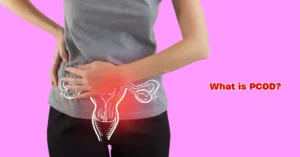
PCOD is a hormonal imbalance that affects the ovaries and can lead to various health issues in women. The primary characteristic of PCOD is the formation of small, fluid-filled sacs called cysts on the ovaries. These cysts are not harmful in themselves, but they are a sign of an underlying hormonal imbalance.
PCOD is more common today due to lifestyle changes like unhealthy diets, lack of exercise, and high-stress levels. Modern diets often include processed foods and sugary drinks, leading to weight gain and insulin resistance, which can trigger PCOD. Sedentary lifestyles and increased stress also contribute to hormonal imbalances. Additionally, better awareness and improved medical diagnosis mean more cases are identified now compared to the past. Addressing lifestyle factors can help manage and reduce PCOD symptoms.
Symptoms of PCOD
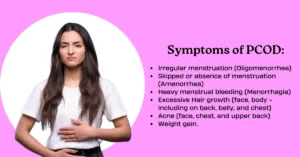
PCOD symptoms include irregular periods, weight gain, and acne. Women may also experience excess hair growth on the face and body, thinning hair on the scalp, and dark patches of skin. Ovaries may have many small cysts, detected by ultrasound. These symptoms are due to hormonal imbalances and can lead to problems like difficulty getting pregnant and an increased risk of diabetes if not managed properly.
PCOD can display itself in different ways, and the symptoms can vary from woman to woman. Some of the most common symptoms are:
- Irregular or missed menstrual periods: Women with PCOD often experience irregular or absent periods, which can make it difficult to predict their menstrual cycle.
- Excessive hair growth (hirsutism): PCOD can lead to an excess production of male hormones, resulting in unwanted hair growth on the face, chest, or back.
- Acne: The hormonal imbalance in PCOD can also cause acne breakouts, particularly on the face, chest, and back.
- Weight gain: Many women with PCOD struggle with weight gain, especially around the abdominal area, despite maintaining a healthy diet and exercise routine.
- Thinning hair or hair loss: Some women with PCOD may experience thinning hair or excessive hair loss due to hormonal changes.
- Infertility: PCOD is one of the leading causes of infertility in women, as the hormonal imbalance can disrupt ovulation and make it difficult to conceive naturally.
Causes of PCOD
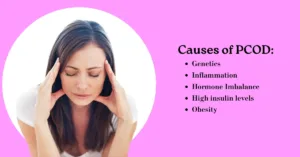
PCOD is caused by a mix of factors like genetics, hormonal imbalances, and lifestyle. Family history can increase risk, and high levels of male hormones disrupt ovulation. Insulin resistance, often due to poor diet and lack of exercise, leads to higher insulin and androgen levels. Stress and inflammation also play a role. These combined factors contribute to the development of PCOD in women.
While the exact cause of PCOD is not fully understood, several factors are believed to contribute to its development:
- Hormonal imbalance: The primary cause of PCOD is an imbalance in the levels of hormones produced by the ovaries and the pituitary gland, leading to an excess production of male hormones (androgens).
- Insulin resistance: Many women with PCOD have insulin resistance, which means their cells don’t respond effectively to insulin, a hormone that regulates blood sugar levels. This can lead to elevated levels of insulin and contribute to the hormonal imbalance.
- Genetics: PCOD can run in families, suggesting that there may be a genetic component to the disorder.
- Lifestyle factors: Obesity, a sedentary lifestyle, and a diet high in processed foods and refined carbohydrates can increase the risk of developing PCOD or exacerbate existing symptoms.
Diagnosis and Treatment
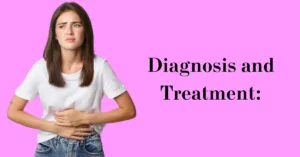
If you suspect you may have PCOD, it’s essential to consult a healthcare professional, such as a gynecologist or an endocrinologist. They may perform several tests, including blood tests to measure hormone levels, ultrasound scans to check for cysts on the ovaries, and physical examinations to assess symptoms.
Treatment for PCOD typically involves a combination of lifestyle changes and medication, depending on the severity of the symptoms and the woman’s overall health goals. Some common treatment approaches include:
- Lifestyle modifications: Adopting a healthy diet rich in whole foods, engaging in regular physical activity, and maintaining a healthy weight can help manage PCOD symptoms and improve overall well-being.
- Medication: Depending on the specific symptoms and the woman’s reproductive goals, healthcare providers may prescribe medications such as:
- Birth control pills: These can help regulate menstrual cycles and reduce androgen levels.
- Metformin: This medication, typically used for type 2 diabetes, can help improve insulin sensitivity and regulate menstrual cycles.
- Anti-androgen medications: These can help reduce excessive hair growth and acne caused by high androgen levels.
- Fertility treatments: For women with PCOD who are struggling with infertility, fertility treatments such as ovulation induction medication, in vitro fertilization (IVF), or other assisted reproductive technologies may be recommended.
Managing PCOD

While PCOD is a chronic condition with no definitive cure, it can be effectively managed through a combination of lifestyle changes, medication, and regular check-ups with a healthcare professional. Women with PCOD need to be proactive in their self-care and seek support from their healthcare team, as well as from support groups or counseling if needed.
Managing PCOD carefully is crucial because it can lead to serious health issues like diabetes, heart disease, and infertility if untreated. Regular exercise, a healthy diet, and stress management help balance hormones and control symptoms. Medications can also regulate periods and reduce other symptoms. Early and careful management improves overall health, prevents complications, and enhances the quality of life for women with PCOD.
Conclusion

PCOD is a common hormonal disorder that affects a significant number of women worldwide. While it can present various challenges, including irregular periods, fertility issues, and other physical symptoms, it is a manageable condition. By understanding the causes, symptoms, and available treatment options, women with PCOD can take control of their health and work towards achieving a balanced and fulfilling life. Remember, early diagnosis and proper management are key to minimizing the impact of PCOD and maintaining overall well-being.
FAQs
Q1. What is PCOD Problem in Females?
A: PCOD is a hormonal disorder in females where the ovaries produce an excessive amount of male hormones, leading to irregular periods and other symptoms.
Q2. What causes PCOD?
A: The exact cause of PCOD is unknown, but it is believed to be linked to insulin resistance, genetics, and environmental factors.
Q3. What are the symptoms of PCOD?
A: Common symptoms include irregular periods, excessive hair growth, acne, weight gain, and difficulty getting pregnant.
Q4. How is PCOD treated?
A: Treatment options include lifestyle changes, medications to regulate hormones and insulin levels, and in some cases, fertility treatments.
Q5. Can PCOD be prevented?
A: While PCOD cannot be entirely prevented, maintaining a healthy weight, exercising regularly, and managing stress can help reduce the risk.
Also Read:
Understanding The Top 7 PCOD Problem Symptoms
What is the PCOD problem? All you need to know in 2024.
References:
https://www.ncbi.nlm.nih.gov/books/NBK459251/
https://www.ncbi.nlm.nih.gov/pmc/articles/PMC9964744/
https://www.ncbi.nlm.nih.gov/pmc/articles/PMC4433074/
Disclaimer: The information provided in this article is for educational purposes only and should not be considered medical advice. Always consult a healthcare professional for diagnosis and treatment related to PCOD or any health condition.
Related post

How to Ace Your Next Job Interview: 5 Tips


